SALEM, Ore. (KOIN) — Melissa Bittler was 14 when she was raped and killed in 2001. Her parents later learned there were rape kits from years before Melissa’s attack that contained the killer’s DNA.
Melissa’s mother shared the anguish of her daughter’s rape and murder with a panel in the Oregon Senate Tuesday. She showed them a picture of Melissa taken 6 months before she was murdered.
“She was a vibrant girl,” her mother, Mary, said. “And then to find out months later that Ladon Stephens had raped 3 young girls back in ’96.”
But there were rape kits that had not been tested.

Her parents believe she might still be alive now if those kits had been tested and the suspect caught.
They testified in a public hearing Tuesday on Senate Bill 1571 — “Melissa’s Law.”
Brenda Tracy, herself a survivor of a sexual assault, recently came across Melissa’s story as she looked into a current backlog of about 5,000 untested rape kits statewide.
Tracy helped put the bill together in Melissa’s honor.
“The fact that we’ve had 5000 people, victims, come forward and get a rape kit done, and those kits are just sitting on shelves collecting dust is a slap in the face to victims,” Tracy said.

The bill requires a plan to get the backlog tested and that kits are tested moving forward. If there is a DNA match, it must be entered right away in a national database.
Tracy said this law would establish timelines for police to follow with rape kits.
“The police have a timeline to pick up the kit from the hospital, they have a timeline to send it in to the lab, it requires prioritization at the lab to get kits tested.”
Police would have to collect a kit from the hospital within 7 days of being notified, and then have 14 days to submit the evidence to the crime lab,
And that, she said, would prevent a future backlog.
The bill also states kit evidence be saved for at least 60 years.How Brenda Tracy got involved
A little more than a year ago, Brenda Tracy came forward with her story. In a Change.org petition, said she “was brutally gang-raped by 4 men, 2 of them Oregon State University football players. I promptly reported the attack to police and got a rape kit done. As the victim, I did everything right… Because of the statute of limitations, I will never see the justice I deserve, but we can help the next victim. …”
Given the chance, she said, she would prosecute now.
Tracy and Danielle Tudor worked with lawmakers to change Oregon’s 6-year statute of limitations. They wanted the statute to be 20 years, but legislators settled on 12 years.
“Melissa’s Law” is in the early stages of the legislative process. The public hearing Tuesday in the Senate Committee on the Judiciary may be followed by a hearing at the Joint Committee on Ways and Means.
But at this writing, no meetings are currently scheduled.